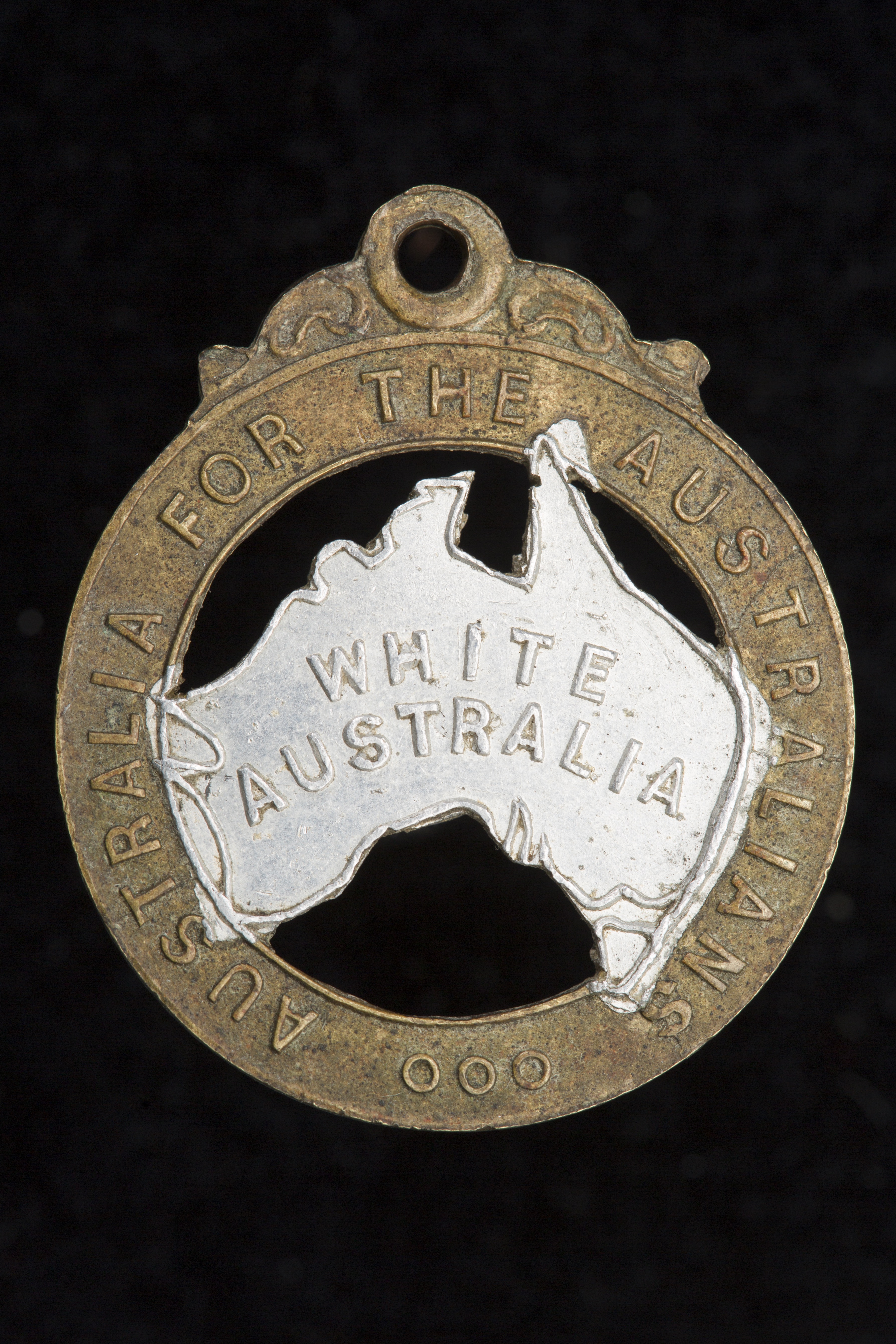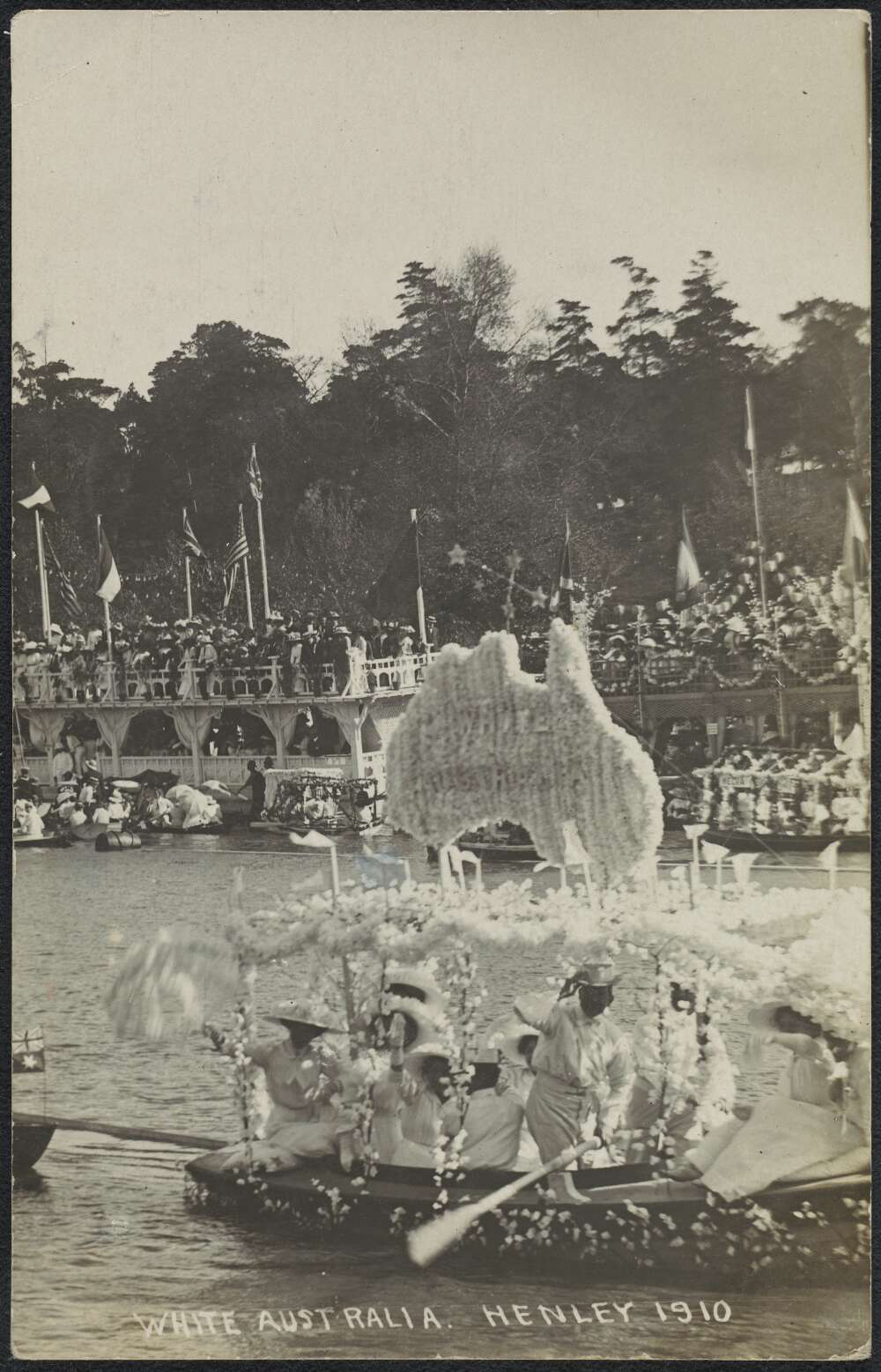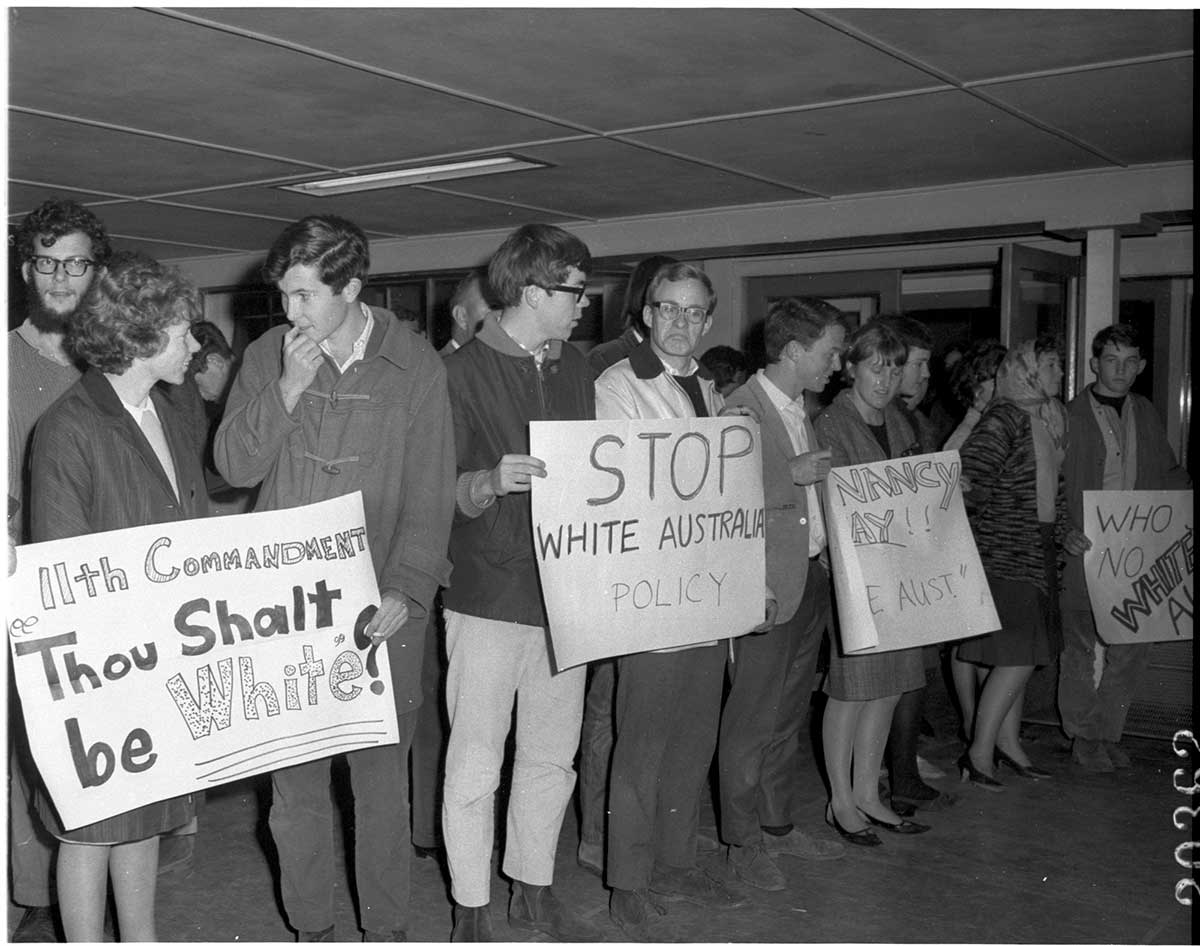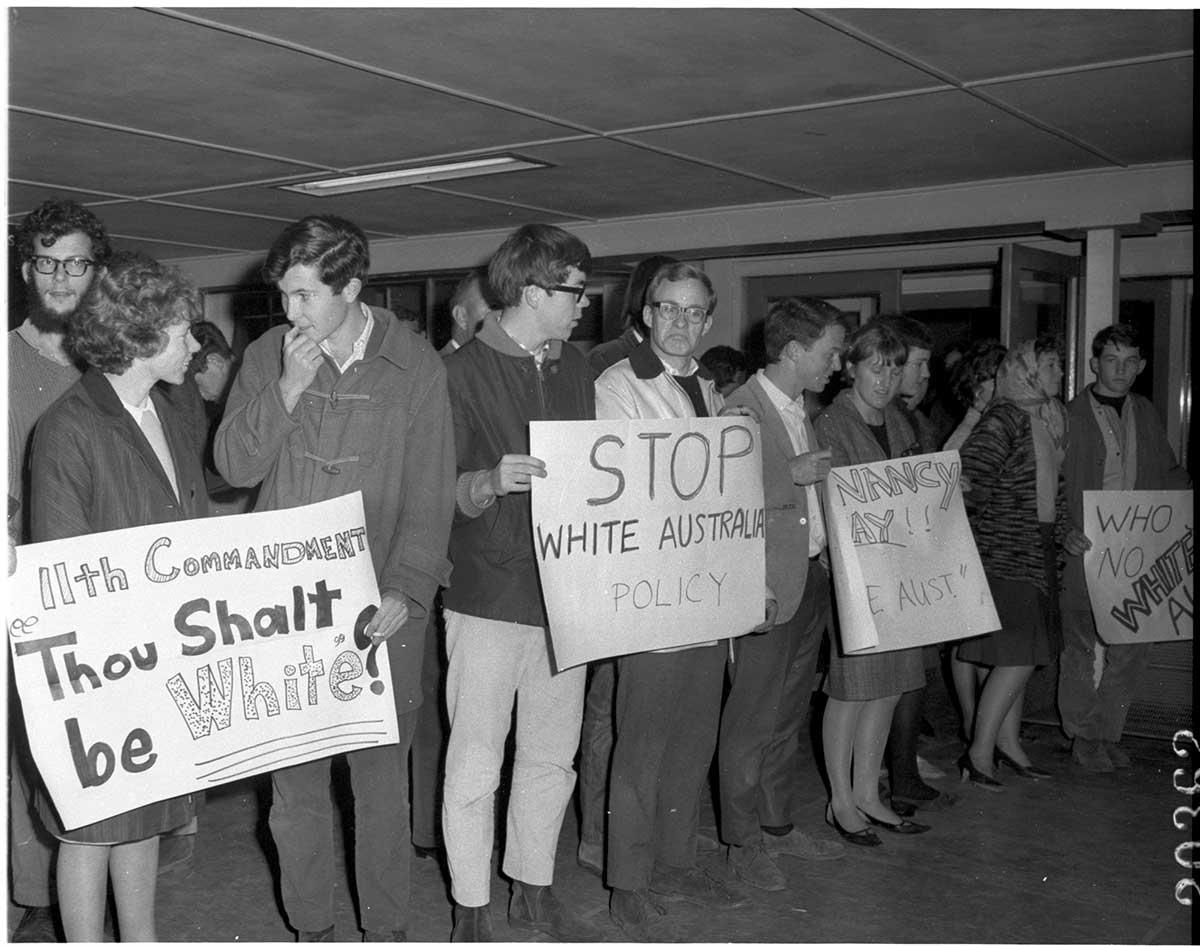Learning module:
Migration experiences Defining Moments, 1945–present
Investigation 3: Ending the White Australia policy
3.2 1901 Creating a White Australia: White Australia policy enshrined in law
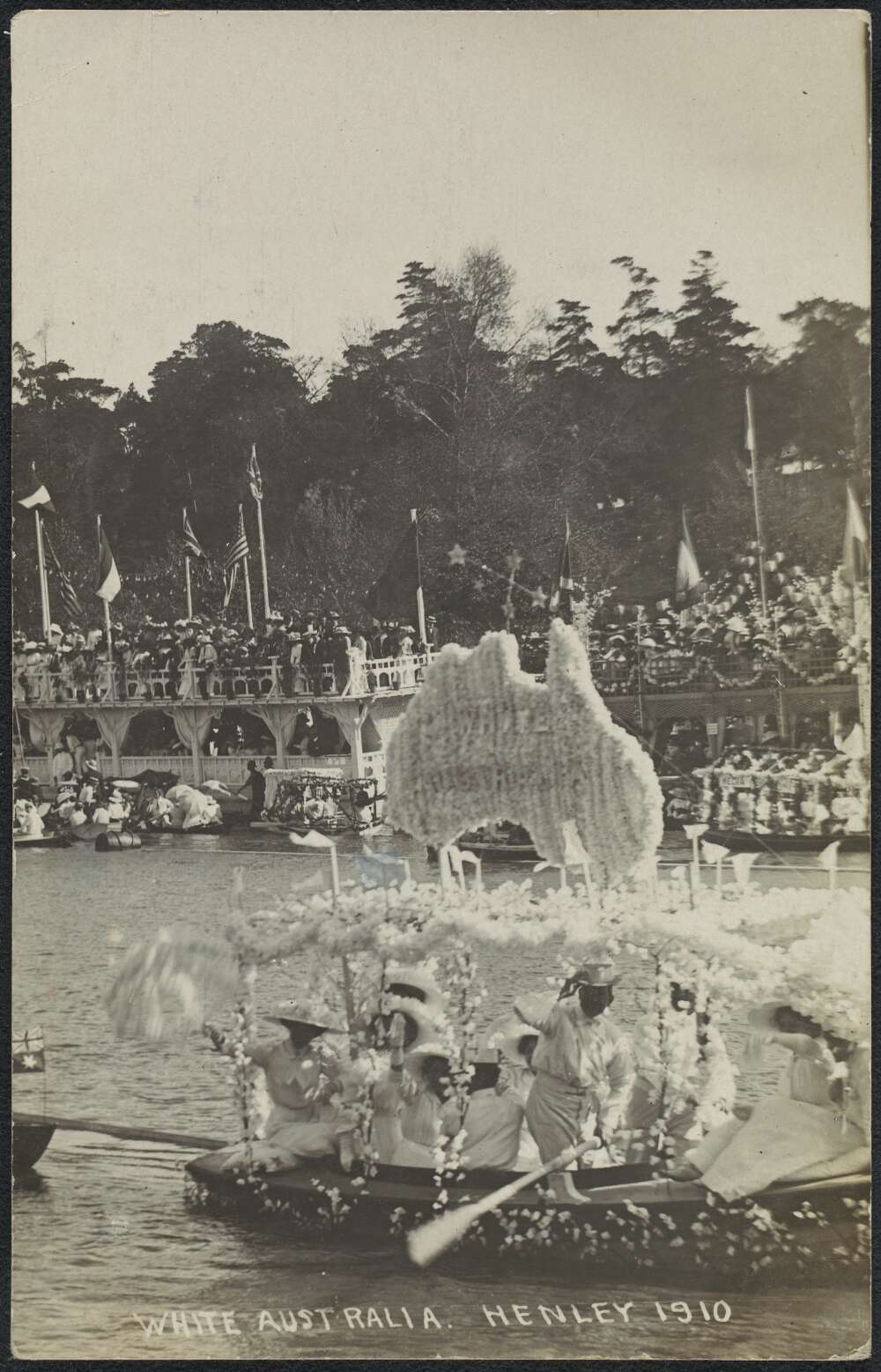
Read the information in the Defining Moment in Australian history: 1901 White Australia policy enshrined in law and use it to answer these questions.
1. What is meant by the White Australia policy? (Note that there was never any one policy, but a set of separate but related restrictions.)
Look at the cartoon showing the ‘The Mongolian Octopus’ published in the Bulletin magazine in 1886.
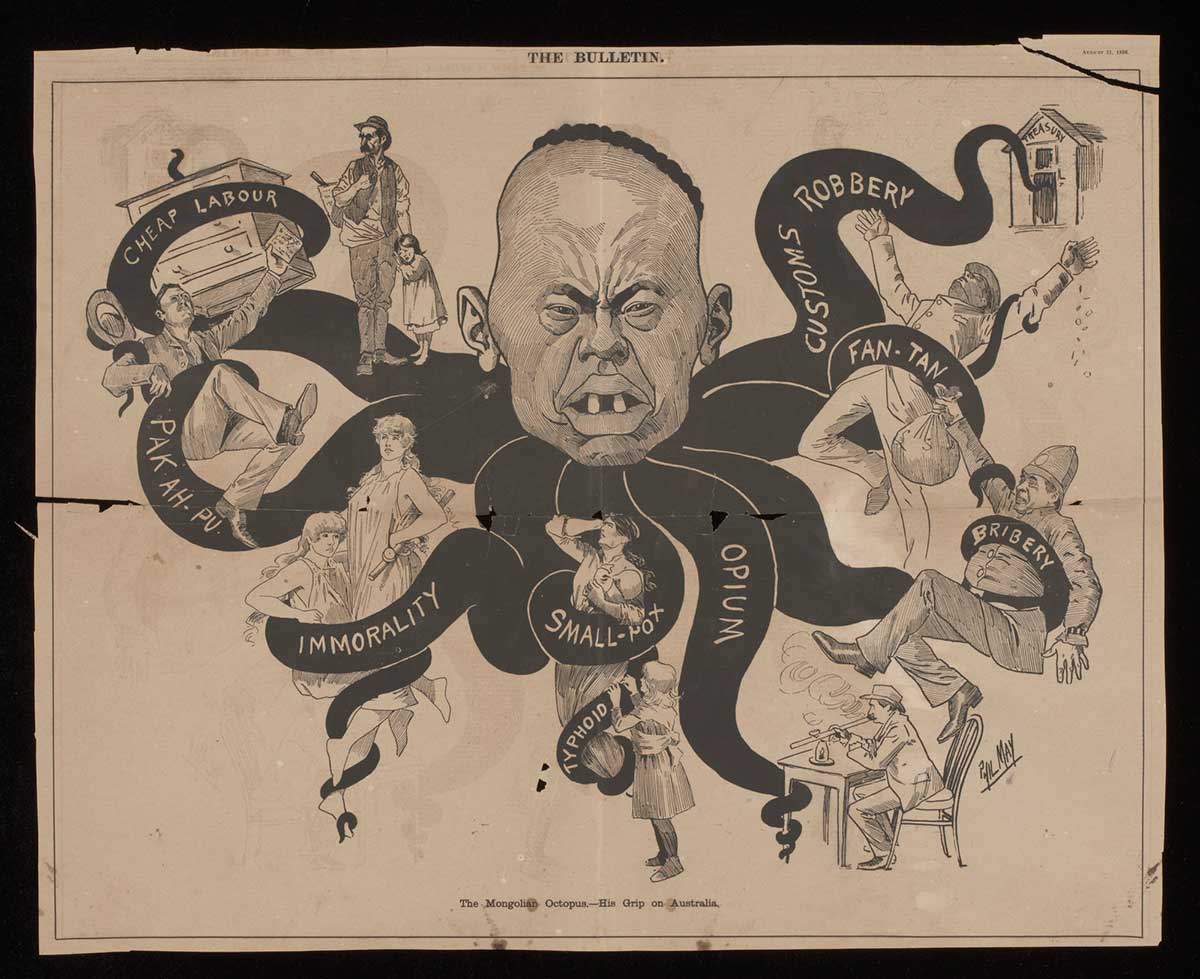
2. What is the message of the cartoon? What does it suggest Chinese people were responsible for?
3. The image is very crude and exaggerated, but was probably very influential. Why do you think people might have responded to such a negative and exclusionary image?
4. What were the economic arguments used against people of non-European descent? What were the social arguments used against them?
5. Why did most people feel at the time that the restrictions were justified?
6. The main instrument of the White Australia policy was the Immigration Restriction Act 1901.
7. The main test was a dictation test. How did the government use this test to prevent non-white migrants from gaining entry to Australia?
8. What other major Acts of Parliament reinforced this exclusion?
9. How successful was the White Australia policy in achieving the aims of the Government?
Look back at the Key questions. Which of these questions do you think you can now answer fully? Which need more research?
10. Now complete this sentence:
Exploring further
What were the reasons for creating this White Australia policy?
11. Here are extracts from some of the speeches made by Commonwealth politicians during the debates on the Immigration Restriction Act. Read them and decide, by choosing one or more of the four options, if their support or opposition to the Act were based on Economic, Social, Racial or Fairness arguments and ideas. One example has been done to illustrate this.
Note that in some cases you may find several of these being used in the one speech. It’s up to you to decide each time but be ready to justify your choices.
You may also note that much of the discussion was about Japanese, as well as Chinese, immigration. The Japanese nation had, by 1901, industrialised and westernised, and was emerging as a powerful, modern nation. You will also find ideas and language that are unacceptable today.
(A) Prime Minister Barton, Protectionist, New South Wales
I do not think either that the doctrine of the equality of man was really ever intended to include racial equality. There is that basic inequality. These races are, in comparison with white races — I think no one wants convincing of this fact — unequal and inferior. The doctrine of the equality of man was never intended to apply to the equality of the Englishman and the Chinaman. There is a deep-set difference, and we see no prospect and no promise of its ever being effaced. Nothing in this world can put these two races upon an equality. Nothing we can do by cultivation, by refinement, or by anything else will make some races equal to others.
Commonwealth Parliamentary Debates 1901–2, vol. 4, p. 5233
(B) Attorney-General Alfred Deakin, Protectionist, Victoria
For my part, I have been very careful from the first not to attempt to justify this Bill, and the exclusiveness of feeling which it represents on the score of any moral or other inferiority on the part of those whom we desire to exclude. Whether or not there exists such inferiority is a matter for argument or dispute elsewhere. I have frankly stated from the first that the exclusiveness on the part of the Australian people is perfectly independent of the mental and moral status of the Japanese, when measured by the only standards that can be properly applied to them, namely, those of their own race and of their own history … I have very grave doubts as to whether our form of civilisation is beneficial to these people. I doubt whether it does not work far more injury than advantage to them …
Our civilisation belongs to us, and we belong to it; we are bred in it, and it is bred in us. It fits us and is our means of progress and advancement. These people have their own independent development, their own qualities, and also the civilisation, forms of life and government, which naturally attach to them. They are separated from us by a gulf which we cannot bridge to the advantage of either. The attitude of Australia is not an offensive one when it becomes understood that it is based upon these principles. It is not based upon any claim of superiority. Where is the standard of comparison just to both? I am endeavouring to satisfy the House that arguments which are used in favour of exclusion do not call for any reflection whatever upon the character or capacity of the people excluded. That is not necessary. It is sufficient that these people do not blend with us, and that they cannot share our social life or our forms of self-government.
Commonwealth Parliamentary Debates 1901–2, vol. 4, pp. 5819–20
(C) Sir Malcolm McEacharn, Protectionist, Victoria
A great deal more has been made out of the danger to the Commonwealth through alien immigration than is warranted by the circumstances. If the proposal to pass fresh legislation had been brought forward as a protection to labour, I would have been one of the first to support it. I recognise that if Japanese can come here in any large number, they will compete at low rates with white labour, and I will be no party to that … [But] I will not join in shutting out those who have come here to carry out industries which would never have been developed or have reached their present state of prosperity, except by means of alien labour.
Commonwealth Parliamentary Debates 1901–2, vol. 4, pp. 5350–1
(D) Bruce Smith, Free Trade, New South Wales
[T]he Bill as introduced was hypocritical in form and to a great extent its form is still hypocritical. Whilst we are professing a profound anxiety about the educational qualifications of people who may come to our shores, the foundation of the Bill is racial prejudice, and the desire… that some other races who by reason of their possessing certain qualities, which I think come under the category of old fashioned virtues, shall not come here and be a menace to our industrial system.
… I think it a humiliating confession that the principal reason for shutting out the Japanese race is, not that they are a low type of humanity or a degraded people, but that they are too thrifty. They work too hard, and they are too provident, and they possess so many of those old-fashioned virtues that we Britishers cannot compete with them in our daily life… I think it is a humiliating confession to go forth to the world from one in so high a position that the truth is that we are afraid to come into contact and competition with a race like the Japanese.
Commonwealth Parliamentary Debates 1901–2, vol. 4, pp. 5157–8
(E) Senator James Macfarlane, Free Trade, Tasmania
I do not approve of this Bill, which is against the traditions of the British Empire. It is evident that it is very objectionable to the British Government because it takes cognisance of race, colour and country of origin. That is… objectionable, and against the traditions of the British Empire… The cry that we shall be overrun with Asiatics I consider ill-founded… I deny that at present there is any danger of the contamination of our race. An Englishman is not contaminated by a residence among the millions of India or China; if so why are we so anxious to have full liberty to travel and trade amongst them? As a matter of fact, we, as the stronger and more highly civilised race, raise and ennoble them. I cannot see that there is the least possibility of any danger to the Commonwealth for very many years to come… I should have liked to see the Japanese nation excluded from the operation of the Bill… The Japanese are a very intelligent race whom we can look up to and respect, and we can derive great profit from our intercourse with them.
Commonwealth Parliamentary Debates 1901–2, vol. 4, pp. 7184–5
(F) Staniforth Smith, Free Trade, Western Australia
All anthropologists agree that the Caucasian races cannot mingle with the Mongolian, the Hindoo, or the negro… Many of the States of the United States of America have found it necessary to pass laws preventing marriages between white and coloured people. Would it not be very much more statesmanlike for us… to explain to the Japanese that on scientific and ethnological grounds we cannot allow them to come here, not because we think they are inferior, but because we cannot mingle with them, and cannot allow them to grow up a separate community in our midst.
Commonwealth Parliamentary Debates 1901–2, vol. 4, p. 7246
(G) John Watson, Labor, New South Wales
We object to them not alone on the ground of competition with our own workmen — though I admit that is one of the grounds — but also and more particularly on the ground of racial contamination… The question is whether we would desire that our sisters or our brothers should be married into any of these races to which we object. If these people are not such as we can meet upon an equality, and not such as we can feel that it is no disgrace to intermarry with, and not such as we can expect to give us an infusion of blood that will tend to the raising of our standard of life, and to the improvement of the race, we should be foolish in the extreme if we did not exhaust every means of preventing them from coming to this land, which we have made our own.
The racial aspect of the question, in my opinion, is the larger and more important one; but the industrial also has to be considered… With the Oriental, as a rule, the more he is educated, the more cunning he becomes, and the more able, with his peculiar ideas of social and business morality, to cope with the people here. I do not think there is any advantage in restricting the admission of coloured people to those who are educated; and, in any case, I contend that the number which will filter through under the Government’s proposal will still be sufficiently large to constitute a great menace to the wellbeing of the people as a whole.
Commonwealth Parliamentary Debates 1901–2, vol. 4, pp. 5376, 4633, 4636
(H) James Fowler, Labor, Western Australia
If we simply say to them that we bear them no malice whatever, that we are not even prepared to argue that they are inferior to us in any way, but that simply because Australia is to be the heritage of the British people we object to their coming here, we shall be taking up a position which is absolutely unassailable. I would not for one moment argue that these people are inferior to us on many of the grounds urged by honourable members… If Japan were threatened by an influx of foreign people in any such numbers as we in Australia are threatened with, they would no doubt feel thoroughly justified in taking the measures which we are about to adopt. So, also, would every other nation on the face of the earth.
Commonwealth Parliamentary Debates 1901–2, vol. 4, p. 4832
(I) William Guthrie Spence, Labor, Queensland
We have the Parliament absolutely unanimous in thinking that we should take a stand as a young nation on new lines — that we should profit by the experience of other countries, particularly the experience of the great federated states of America, which from their initial mistake have a trouble facing them which is occupying the best minds and intellects amongst their great people. The United States people have some 13,000,000 of a coloured race in their midst, and they do not know what to do with them… Let us say at the birth of the nation that we are going to adopt the course which is calculated to give our people the best possible opportunity… The Hindoos have shown themselves to be friends of England; and some of our best fighting material has come from India. But I refuse to believe that if these coloured men were living here they would maintain our present living wage. The lack of welding together, owing to the differences between their ideas and our own would be a permanent obstacle to its maintenance.
Commonwealth Parliamentary Debates 1901–2, vol. 4, p. 5153
12. From these extracts, summarise some of the Australian people’s attitudes and beliefs towards different ethnic groups at that time.
13. Why do you think that ideas of racial equality that we take for granted today did not apply to the societies of 1901 around the world?
What were the reasons for creating this White Australia policy?
11. Here are extracts from some of the speeches made by Commonwealth politicians during the debates on the Immigration Restriction Act. Read them and decide, by choosing one or more of the four options, if their support or opposition to the Act were based on Economic, Social, Racial or Fairness arguments and ideas. One example has been done to illustrate this.
Note that in some cases you may find several of these being used in the one speech. It’s up to you to decide each time but be ready to justify your choices.
You may also note that much of the discussion was about Japanese, as well as Chinese, immigration. The Japanese nation had, by 1901, industrialised and westernised, and was emerging as a powerful, modern nation. You will also find ideas and language that are unacceptable today.
(A) Prime Minister Barton, Protectionist, New South Wales
I do not think either that the doctrine of the equality of man was really ever intended to include racial equality. There is that basic inequality. These races are, in comparison with white races — I think no one wants convincing of this fact — unequal and inferior. The doctrine of the equality of man was never intended to apply to the equality of the Englishman and the Chinaman. There is a deep-set difference, and we see no prospect and no promise of its ever being effaced. Nothing in this world can put these two races upon an equality. Nothing we can do by cultivation, by refinement, or by anything else will make some races equal to others.
Commonwealth Parliamentary Debates 1901–2, vol. 4, p. 5233
(B) Attorney-General Alfred Deakin, Protectionist, Victoria
For my part, I have been very careful from the first not to attempt to justify this Bill, and the exclusiveness of feeling which it represents on the score of any moral or other inferiority on the part of those whom we desire to exclude. Whether or not there exists such inferiority is a matter for argument or dispute elsewhere. I have frankly stated from the first that the exclusiveness on the part of the Australian people is perfectly independent of the mental and moral status of the Japanese, when measured by the only standards that can be properly applied to them, namely, those of their own race and of their own history … I have very grave doubts as to whether our form of civilisation is beneficial to these people. I doubt whether it does not work far more injury than advantage to them …
Our civilisation belongs to us, and we belong to it; we are bred in it, and it is bred in us. It fits us and is our means of progress and advancement. These people have their own independent development, their own qualities, and also the civilisation, forms of life and government, which naturally attach to them. They are separated from us by a gulf which we cannot bridge to the advantage of either. The attitude of Australia is not an offensive one when it becomes understood that it is based upon these principles. It is not based upon any claim of superiority. Where is the standard of comparison just to both? I am endeavouring to satisfy the House that arguments which are used in favour of exclusion do not call for any reflection whatever upon the character or capacity of the people excluded. That is not necessary. It is sufficient that these people do not blend with us, and that they cannot share our social life or our forms of self-government.
Commonwealth Parliamentary Debates 1901–2, vol. 4, pp. 5819–20
(C) Sir Malcolm McEacharn, Protectionist, Victoria
A great deal more has been made out of the danger to the Commonwealth through alien immigration than is warranted by the circumstances. If the proposal to pass fresh legislation had been brought forward as a protection to labour, I would have been one of the first to support it. I recognise that if Japanese can come here in any large number, they will compete at low rates with white labour, and I will be no party to that … [But] I will not join in shutting out those who have come here to carry out industries which would never have been developed or have reached their present state of prosperity, except by means of alien labour.
Commonwealth Parliamentary Debates 1901–2, vol. 4, pp. 5350–1
(D) Bruce Smith, Free Trade, New South Wales
[T]he Bill as introduced was hypocritical in form and to a great extent its form is still hypocritical. Whilst we are professing a profound anxiety about the educational qualifications of people who may come to our shores, the foundation of the Bill is racial prejudice, and the desire… that some other races who by reason of their possessing certain qualities, which I think come under the category of old fashioned virtues, shall not come here and be a menace to our industrial system.
… I think it a humiliating confession that the principal reason for shutting out the Japanese race is, not that they are a low type of humanity or a degraded people, but that they are too thrifty. They work too hard, and they are too provident, and they possess so many of those old-fashioned virtues that we Britishers cannot compete with them in our daily life… I think it is a humiliating confession to go forth to the world from one in so high a position that the truth is that we are afraid to come into contact and competition with a race like the Japanese.
Commonwealth Parliamentary Debates 1901–2, vol. 4, pp. 5157–8
(E) Senator James Macfarlane, Free Trade, Tasmania
I do not approve of this Bill, which is against the traditions of the British Empire. It is evident that it is very objectionable to the British Government because it takes cognisance of race, colour and country of origin. That is… objectionable, and against the traditions of the British Empire… The cry that we shall be overrun with Asiatics I consider ill-founded… I deny that at present there is any danger of the contamination of our race. An Englishman is not contaminated by a residence among the millions of India or China; if so why are we so anxious to have full liberty to travel and trade amongst them? As a matter of fact, we, as the stronger and more highly civilised race, raise and ennoble them. I cannot see that there is the least possibility of any danger to the Commonwealth for very many years to come… I should have liked to see the Japanese nation excluded from the operation of the Bill… The Japanese are a very intelligent race whom we can look up to and respect, and we can derive great profit from our intercourse with them.
Commonwealth Parliamentary Debates 1901–2, vol. 4, pp. 7184–5
(F) Staniforth Smith, Free Trade, Western Australia
All anthropologists agree that the Caucasian races cannot mingle with the Mongolian, the Hindoo, or the negro… Many of the States of the United States of America have found it necessary to pass laws preventing marriages between white and coloured people. Would it not be very much more statesmanlike for us… to explain to the Japanese that on scientific and ethnological grounds we cannot allow them to come here, not because we think they are inferior, but because we cannot mingle with them, and cannot allow them to grow up a separate community in our midst.
Commonwealth Parliamentary Debates 1901–2, vol. 4, p. 7246
(G) John Watson, Labor, New South Wales
We object to them not alone on the ground of competition with our own workmen — though I admit that is one of the grounds — but also and more particularly on the ground of racial contamination… The question is whether we would desire that our sisters or our brothers should be married into any of these races to which we object. If these people are not such as we can meet upon an equality, and not such as we can feel that it is no disgrace to intermarry with, and not such as we can expect to give us an infusion of blood that will tend to the raising of our standard of life, and to the improvement of the race, we should be foolish in the extreme if we did not exhaust every means of preventing them from coming to this land, which we have made our own.
The racial aspect of the question, in my opinion, is the larger and more important one; but the industrial also has to be considered… With the Oriental, as a rule, the more he is educated, the more cunning he becomes, and the more able, with his peculiar ideas of social and business morality, to cope with the people here. I do not think there is any advantage in restricting the admission of coloured people to those who are educated; and, in any case, I contend that the number which will filter through under the Government’s proposal will still be sufficiently large to constitute a great menace to the wellbeing of the people as a whole.
Commonwealth Parliamentary Debates 1901–2, vol. 4, pp. 5376, 4633, 4636
(H) James Fowler, Labor, Western Australia
If we simply say to them that we bear them no malice whatever, that we are not even prepared to argue that they are inferior to us in any way, but that simply because Australia is to be the heritage of the British people we object to their coming here, we shall be taking up a position which is absolutely unassailable. I would not for one moment argue that these people are inferior to us on many of the grounds urged by honourable members… If Japan were threatened by an influx of foreign people in any such numbers as we in Australia are threatened with, they would no doubt feel thoroughly justified in taking the measures which we are about to adopt. So, also, would every other nation on the face of the earth.
Commonwealth Parliamentary Debates 1901–2, vol. 4, p. 4832
(I) William Guthrie Spence, Labor, Queensland
We have the Parliament absolutely unanimous in thinking that we should take a stand as a young nation on new lines — that we should profit by the experience of other countries, particularly the experience of the great federated states of America, which from their initial mistake have a trouble facing them which is occupying the best minds and intellects amongst their great people. The United States people have some 13,000,000 of a coloured race in their midst, and they do not know what to do with them… Let us say at the birth of the nation that we are going to adopt the course which is calculated to give our people the best possible opportunity… The Hindoos have shown themselves to be friends of England; and some of our best fighting material has come from India. But I refuse to believe that if these coloured men were living here they would maintain our present living wage. The lack of welding together, owing to the differences between their ideas and our own would be a permanent obstacle to its maintenance.
Commonwealth Parliamentary Debates 1901–2, vol. 4, p. 5153
12. From these extracts, summarise some of the Australian people’s attitudes and beliefs towards different ethnic groups at that time.
13. Why do you think that ideas of racial equality that we take for granted today did not apply to the societies of 1901 around the world?






